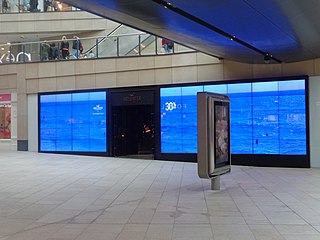
Advertising is a marketing communication that employs an openly sponsored, non-personal message to promote or sell a product, service or idea. Sponsors of advertising are typically businesses wishing to promote their products or services. Advertising is differentiated from public relations in that an advertiser pays for and has control over the message. It differs from personal selling in that the message is non-personal, i.e., not directed to a particular individual. Advertising is communicated through various mass media, including traditional media such as newspapers, magazines, television, radio, outdoor advertising or direct mail; and new media such as search results, blogs, social media, websites or text messages. The actual presentation of the message in a medium is referred to as an advertisement.

Marketing is the process of exploring, creating, and delivering value to meet the needs of a target market in terms of goods and services; potentially including selection of a target audience; selection of certain attributes or themes to emphasize in advertising; operation of advertising campaigns; attendance at trade shows and public events; design of products and packaging attractive to buyers; defining the terms of sale, such as price, discounts, warranty, and return policy; product placement in media or with people believed to influence the buying habits of others; agreements with retailers, wholesale distributors, or resellers; and attempts to create awareness of, loyalty to, and positive feelings about a brand. Marketing is typically done by the seller, typically a retailer or manufacturer. Sometimes tasks are contracted to a dedicated marketing firm or advertising agency. More rarely, a trade association or government agency advertises on behalf of an entire industry or locality, often a specific type of food, food from a specific area, or a city or region as a tourism destination.

Sales are activities related to selling or the number of goods sold in a given targeted time period. The delivery of a service for a cost is also considered a sale.

Guerrilla marketing is an advertisement strategy in which a company uses surprise and/or unconventional interactions in order to promote a product or service. It is a type of publicity. The term was popularized by Jay Conrad Levinson's 1984 book Guerrilla Marketing.
Sales promotion is one of the elements of the promotional mix. The primary elements in the promotional mix are advertising, personal selling, direct marketing and publicity/public relations. Sales promotion uses both media and non-media marketing communications for a pre-determined, limited time to increase consumer demand, stimulate market demand or improve product availability. Examples include contests, coupons, freebies, loss leaders, point of purchase displays, premiums, prizes, product samples, and rebates.
A marketing plan may be part of an overall business plan. Solid marketing strategy is the foundation of a well-written marketing plan so that goals may be achieved. While a marketing plan contains a list of actions, without a sound strategic foundation, it is of little use to a business.
In marketing, publicity is the public visibility or awareness for any product, service, person or organization. It may also refer to the movement of information from its source to the general public, often via the media. The subjects of publicity include people of public interest, goods and services, organizations, and works of art or entertainment.
Marketing Communications refers to the use of different marketing channels and tools in combination. Marketing communication channels focus on how businesses communicate a message to its desired market, or the market in general. It is also in charge of the internal communications of the organization. Marketing communication tools include advertising, personal selling, direct marketing, sponsorship, communication, public relations, social media, customer journey and promotion.

Advertising management is a planned managerial process designed to oversee and control the various advertising activities involved in a program to communicate with a firm's target market and which is ultimately designed to influence the consumer's purchase decisions. Advertising is just one element in a company's promotional mix and as such, must be integrated with the overall marketing communications program. Advertising is, however, the most expensive of all the promotional elements and therefore must be managed with care and accountability. Advertising management process also helps in defining the outline of the media campaign and in deciding which type of advertising would be used before the launch of a product.
In marketing, promotion refers to any type of marketing communication used to inform target audiences of the relative merits of a product, service, brand or issue, most of the time persuasive in nature. It helps marketers to create a distinctive place in customers' mind, it can be either a cognitive or emotional route. The aim of promotion is to increase brand awareness, create interest, generate sales or create brand loyalty. It is one of the basic elements of the market mix, which includes the four Ps, i.e., product, price, place, and promotion.

An advertising campaign is a series of advertisement messages that share a single idea and theme which make up an integrated marketing communication (IMC). An IMC is a platform in which a group of people can group their ideas, beliefs, and concepts into one large media base. Advertising campaigns utilize diverse media channels over a particular time frame and target identified audiences.
In marketing, the promotional mix describes a blend of promotional variables chosen by marketers to help a firm reach its goals. It has been identified as a subset of the marketing mix. It is believed that there is an optimal way of allocating budgets for the different elements within the promotional mix to achieve best marketing results, and the challenge for marketers is to find the right mix of them. Activities identified as elements of the promotional mix vary, but typically include the following:
Business marketing is a marketing practice of individuals or organizations. It allows them to sell products or services to other companies or organizations that resell them, use them in their products or services or use them to support their works. It is a way to promote business and improve profit too.

A product sample is a sample of a consumer product that is given to the consumer free of cost so that they may try a product before committing to a purchase.
The following outline is provided as an overview of and topical guide to marketing:

A brand ambassador is a person engaged by an organization or company to represent its brand in a positive light, helping to increase brand awareness and sales. The brand ambassador is meant to embody the corporate identity in appearance, demeanor, values and ethics. The key element of brand ambassadors is their ability to use promotional strategies that will strengthen the customer-product-service relationship, influence a large audience to buy and consume more.
Account executive is a role in sales, advertising, marketing, and finance involving intimate understanding of a client company's objectives and products and a professional capability to provide effective advice toward creation of successful promotional activities and strategies. The account executive directly works with, and provides services to, one or more delegate officers or executives of the client company.
A target market, also known as serviceable obtainable market (SOM), is a group of customers within a business's serviceable available market at which a business aims its marketing efforts and resources. A target market is a subset of the total market for a product or service.

Promotional merchandise are products branded with a logo or slogan and distributed at little or no cost to promote a brand, corporate identity, or event. Such products, which are often informally called promo products, swag, tchotchkes, or freebies, are used in marketing and sales. They are given away or sold at a loss to promote a company, corporate image, brand, or event. They are often distributed as handouts at trade shows, at conferences, on sales calls, and as bonus items in shipped orders. They are often used in guerrilla marketing campaigns.
Also known as guerrilla marketing or ambush marketing, attack marketing is a form of marketing that incorporates a series of creative and strategic techniques used to build and maintain public awareness surrounding a person, place, product, or event. Attack marketing utilizes the power of social interactions to execute non-traditional marketing campaigns that drive sales, increase name awareness and create long-term buzz around a specific business. Attack marketing is used by many marketing, advertising, public relations and promotional event marketing agencies to promote popular worldwide brands and events. Attack marketing can be tailored to fit marketing programs of all budgets, small and large.








